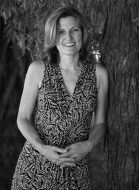Lessons
My daughter dreads middle school science
because all they study is cataclysm,
end-stopped species after end-stopped species,
earth’s slow dwindling.
There is no longer a world to study
that teems with life, not a globe ecstatic
in its wild spinning. Day after day,
they regard the crumbling edge,
broken asphalt where a road runs out
and we launch ourselves like lemmings
over the side. When I was a girl,
my most lasting science experiment consisted
of pinching pieces one by one from
my mother’s impatiens plants then watching
through a tiny drinking glass as
each stalk sent new roots fingering out
into the water. My daughter sits quiet
in science through all the bad news.
She sits quiet during the active shooter
drills, even the one that goes on so long
her teacher thinks it is the real thing,
and she’s quiet in the car after the birthday
party for the girl whose mom was killed
by that crazy man in Las Vegas. I tell her I want to go
solar, because of global warming, and she says
she hates science, and I keep thinking
of the IRS auditor we had—the one who truly regretted
telling us what a shoddy bookkeeper I am—
how he used to be a CPA and missed it.
His clients all had futures back then,
and he helped to plan them.
Being an IRS agent is all forensics
the way 8th grade science is all
forensics now. The way when I think
of the future, it’s more like looking
at an ending than a beginning. Like
performing an autopsy on something
even as it keeps on living. At dinner,
my daughter reminds me she hates
vegetables, says I should let her
eat whatever she wants to now, while
she’s young and still can. Looking
backward at her future, I think
she may be right. Maybe it already
will not matter.
Frog of God
When the vet prescribes medicine for your frog,
you think it smells all wrong but use it anyway,
dousing him with goodness of heart,
watching his smooth body drink it in—
and see you’ve begun to kill him.
His beautiful, turquoise skin darkens and lesions open on it.
You rinse him in spring water,
but he’s dying, big eyes gone cloudy.
Everyone tells you
he was just a frog,
but you know
he was a frog of God,
fat green Buddha on his branch.
Now, he looks like the baby in Hiroshima,
burned flesh peeling off. Now, he stares
as you cross the room with eyes
like the eyes of Auschwitz trying to capture
the world’s averted gaze.
He could almost be Christ Himself,
emptying the bitter cup
that you, with such pure intentions,
filled to overflowing.
 Francesca Bell is the author of Bright Stain (Red Hen Press, 2019) and the translator of Kitchens and Trains: Poems by Max Sessner (Red Hen Press, 2023). Her work appears widely in such journals as B O D Y, New Ohio Review, North American Review, Massachusetts Review, Mid-American Review, Prairie Schooner, and Rattle. She lives with her family in Novato, California.
Francesca Bell is the author of Bright Stain (Red Hen Press, 2019) and the translator of Kitchens and Trains: Poems by Max Sessner (Red Hen Press, 2023). Her work appears widely in such journals as B O D Y, New Ohio Review, North American Review, Massachusetts Review, Mid-American Review, Prairie Schooner, and Rattle. She lives with her family in Novato, California.

